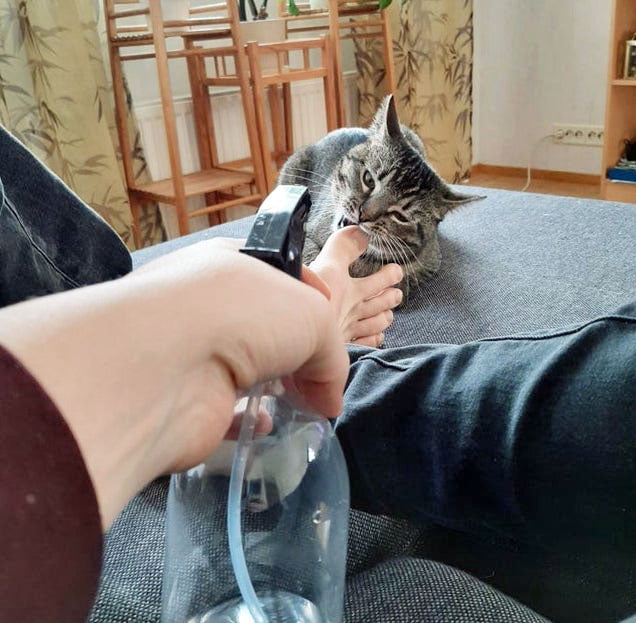
This is a pretty old question and one that pops up frequently. I think it’s still relevant because when you search on the Internet and read about it in books it is apparent that it remains a popular way to alter the behaviour of cats. Jackson Galaxy (who’s visited many homes with cat problems) says that “it seems like everybody has one these days, and in some clients’ homes I have seen them in every room of the house”.
A veterinarian author, Dr. Pippa Elliott MRCVS, writing for the large website WikiHow says that “spray bottle training is a popular method of discouraging cats from engaging in unwanted behaviours…..Although spray bottle training is not recommended by most cat behaviour professionals, some people swear by it”.
The pet owning world is ambivalent about spraying domestic cats with water in order to mould their behaviour. Clearly a lot of people think it is effective which effectively answers the question. But what is it effectively achieving?
It may be effective when the person doing the spraying is in the room with the cat. The cat may associate that person – and it could be the cat’s owner – with something nasty i.e. a punishment which is being sprayed with water which prevents them from doing something which displeases their owner. If it happens like that then the cat’s behavior is being altered through fear of their owner. Do people want their cat to be frightened of them? Clearly a lot of people don’t mind as long as the cat does what they want them to do.
In response to that prospect, Dr. Pippa Elliott says that one way around your cat becoming fearful of you is to spray your cat while they are not watching you so they cannot link the punishment with the person. They think it is divine intervention. This is a way around the problem but I’m not sure it works and secondly the author is missing the moral aspect of this form of discipline. As Jackson Galaxy so correctly says, “it is emblematic of our species’ long-standing belief that we can bend our animals to our will”.
Many people believe in this lopsided relationship. But I for one believe that we should live with our domestic cats on an equal footing as much as we can. We need to respect their behaviour and we certainly shouldn’t try to mould them to our will. Perhaps I am being an impractical purist but I’ve lived with cats this way all my life and it’s worked perfectly well. It is about respect and acceptance; a style of relationship which works in human-to-human relationships very well too.
It is hard to justify training a cat with punishment when there are better alternatives which are nowadays well-known. I’m referring to positive reinforcement. You train your cat to do things through reward i.e. a positive action rather than punishment, a negative action.

Jackson Galaxy also refers to another aspect of cat guardianship. He has a mantra, “maximising compromise”. I believe that he is referring to the fact that when a person lives with a domestic cat they have to compromise and adapt and the same goes for the cat. But as people are in charge and can make rational decisions about these matters they have the obligation to compromise the most. It goes along with respecting your cat’s behaviour. Domestic cats automatically adjust and compromise all the time as they are living in a human world of giants.
The reference to “maximise” must concern maximising the opportunities that living the domestic cat offers by working with a domestic cat’s character and personality rather than fighting against it.
Perhaps it is inappropriate to equate punishing a cat or dog with punishing your spouse. But you would never consider punishing your spouse as a way to try and improve the relationship. Many spouses do punish their significant other because they are behaving instinctively or they’re drunk but everybody recognises the fact that it is, at the very least, immoral behaviour and often criminal. Cats should be treated as members of the family and often are.
Squirting water is probably not a criminal issue although if a person went far enough and added to that mild form of punishment with something more abusive then there is no doubt in my mind that it would arguably be criminal behaviour under most advanced animal welfare laws.
SOME MORE ON CAT PUNISHMENT:

